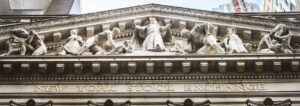Judging by what we read in the newspapers lately, we would think the stock market is struggling with high inflation and a banking crisis around the globe. Yet, since January 1st, 2023, the S&P 500 managed to go up 7.03% on price return. Including dividends, it is up 7.48%. The Canadian index (SPTSX) is also up, by a modest 4.56%, not too shabby for a quarter…
The topics that dominate the news recently are the economic damage brought on by higher interest rates to fight inflation and the ensuing banking crisis with the collapse of Silvergate Bank (crypto-related), Silicon Valley Bank and Signature Bank, all mid-sized regional banking institutions.
In fact, banking is not dissimilar to operating a margin account, with the exception of the fact that the margin clerks are the regulators. Simplistically, bankers take in (i.e. borrow) the depositors’ money – which are liabilities on the bank’s balance sheet, pay them a low interest rate, and use the money to make (i.e. invest in) longer-term loans (mortgages, consumer and commercial loans) and buy (i.e. invest in) government longer-term bonds that carry higher interest rates and pocket the difference – which is “the spread”. The mismatch creates a return, but in times of rising interest rates, can create risks, which is the essence of where managerial responsibilities come in.
After the 40-plus years of declining interest rates, most bank executives have been seduced by the siren song of ever lower interest rates to the point of making money free. Combining greed, bad management and toothless regulation created the perfect storm scenario, where the willingness to ignore risks to chase rapidly diminishing returns bumped into a rising interest rate environment, which by the way, was highly anticipated.
As rates rise, longer-term bonds lose value at a quick pace. If depositors want their money back, banks will be forced to sell their bond holdings and therefore realize losses against the bank’s capital. At some point, the bank’s financial position will be in such a precarious state that they will have to raise more capital or fold, and the remaining assets be bought by stronger banks. Such is the fate of banks with lousy management, including the three mentioned above. We should not feel sorry for them, they really deserve the outcome that they engineered.
Greed: bank executives are rewarded by stock options and Restricted Stock units based on outsized performance but not punished for taking outsized risks (i.e. margin to the max).
Bad management: the same executives ignore the regulators’ warnings when things start going wrong, hoping that markets will eventually put them back onside. Indeed, the experience over the last 40 years proved them right since the Fed always came to their rescue by lowering interest rates.
Toothless regulation: although regulators knew things were taking a turn for the worse at some banks 12 months back, their hands were tied even as banks ignored their warnings. They could not publicly announce these banking problems and then risk creating and being blamed for a bank run in the process. It is not like they know how to stop a bank run when it starts. We did live through a recent experience in Canada when the OSC went public regarding some small irregularities within a Canadian mortgage lender. They effectively created a run on their deposits that almost caused bankruptcy. Thankfully, Warren Buffett came to the rescue, by providing capital.
If tomorrow, the regulators questioned irregularities in any bank, depositors would likely leave that bank and even if it were the Royal Bank, it could go under if the Bank of Canada did not facilitate its survival.
We definitely need stronger regulation for all financial institutions, banks and insurance companies alike. But most importantly, we desperately need accountability among bank executives. Not only should these executives have a big portion of their wealth on the line (meaning having a good portion of their assets invested in their bank’s shares directly), an element of criminal culpability should be introduced when bank executives refuse to abide by the regulations.
We also should be realistic and know that it is not an easy fix: greed and hubris won’t go away.
We wrote back in our 2022 second quarterly letter that “…the bottoming process of a bear market usually involves some sort of a credit event…” and in our 2022 third quarterly letter, we decided to pick on Crédit Suisse: “…It is almost unthinkable that a Swiss giant in finance can manage to destroy itself through speculative and dumb decisions/acquisitions made by incompetent management throughout the 90s and the 2000s. Shareholders paid a hefty price, having witnessed a stock price of CHF 65 in 2007 diving toward today’s CHF 4…”.
Well, we could not foresee the coming collapse of the other three US mid-sized banks. We did not see it coming. Not only is glancing into and predicting the future a difficult business, it usually is not even financially profitable, except for the forecasters who charge a fee for their predictions. Worse, it inflates one’s ego of wanting to be right when one just got lucky. I think it is much easier to stick with simple common sense, as Charlie Munger said: “All I Want To Know Is Where I’m Going To Die So I’ll Never Go There”.
We also wrote about the deserving fate of the “zombie” companies. We have started witnessing their unravelling due to a lack of new funding: The E-snowmobile maker Taiga just announced that they might not make it if they can’t raise new money; Virgin Orbit, a satellite launching services company spun off from Virgin Galactic and backed by billionaire Sir Richard Branson, just laid off 85% of its employees, is unable to raise additional capital, and will likely cease operations.
More companies will collapse and close, some will be bought by stronger companies, and a few will survive under different names and after some major restructuring. Existing shareholders will lose money and new shareholders will come in at a much lower price.
We need to remind ourselves that on the path toward economic progress, a recession is a good remedy for financial excess. The weak must die to leave room for renewal. This is the essence of creative destruction.
We must remember that democracy and capitalism follow a sort of messy process, often two steps forward and one step back.
Now that a few credit events have happened and more and more “zombies” are dying, being absorbed or restructured, we believe the market may be closer to the bottom and valuations are becoming more interesting.
However, we should be mindful of the changed environment from what we are used to:
- Interest rates have declined from 20%+ in the early 80s to 0% during the pandemic of 2022, a decline of 2000 basis points (1 basis point is equal to 0.01%). As we are writing, rates hover around 2-4%. One thing is for sure: from this level, they cannot go down another 2000 basis points…
- With a tight labour environment, wages are still rising. Combined with geopolitical problems slowing down globalization, inflation is not about to go back below 2% any time soon.
- If Economics 101 teaches us anything, it is that real interest rates – which are generally accepted to be the rate of interest on 3-month treasury bills minus the rate of inflation – must be positive for savers to save. Without savings, there will be no investment and no economic growth long term. Therefore, if inflation stays at around 2%, nominal interest rates would have to be around 2-4%, as they are now…
In an environment where interest rates are no longer the main driver, as they have been for the last 13 years or more – and most of the last 40 years – it should follow that the investment strategies that have worked best over those periods may not be the ones that outperform in the years ahead.
As for us, we will continue to invest as we always have – looking for good companies that are well-managed, with positive free cash flow and good growth prospects.
Thank you all for your continued confidence in Claret.
–Alain Chung, CFA, Chairman and CIO, on behalf of the Claret team.







